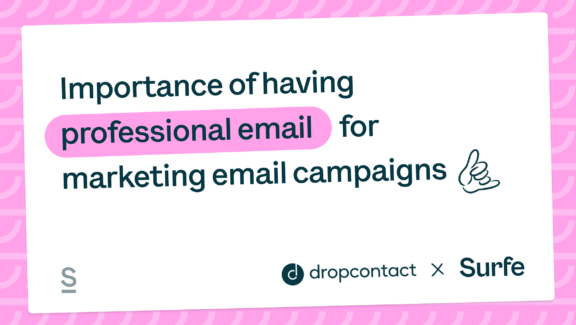Importance of using professional emails for marketing campaigns

Send out professional emails campaigns with confidence thanks to Surfe’s (ex-Leadjet) integration with Dropcontact.
So you’ve crafted the perfect email marketing campaign, but what value does it bring if you can’t reach your prospect?
Whether it’s missing your prospect’s professional email address, lacking GDPR compliance, or dealing with professional emails bounce backs, many obstacles may arise when it comes down to the time to press send on an email marketing campaign.
For these reasons, Surfe (ex-Leadjet) has partnered with Dropcontact (the only 100% GDPR compliant email finder tool) – to help you maintain your momentum as you progress through your sales cadence.
Sign up for your free 14-day trial or book a demo to give Surfe’s (ex-Leadjet) Dropcontact integration a shot.
In addition to retrieving and verifying professional emails, Dropcontact enriches and standardizes the data that is collected to ensure that you always have the most up-to-date information about your prospect.
No more worrying about data hygiene in the CRM, no more spending countless hours double and triple checking your marketing campaigns, and no more manual labor, all thanks to Surfe (ex-Leadjet) and Dropcontact.
Why are email campaigns valuable?
Professional emails are one of the most valuable sales tools, because they enable you to connect directly with your target audience at a very low cost.
The non-invasive nature of professional emails lets your prospect address your message when the time is convenient, making it much more effective than a cold call which requires a person’s immediate attention.
You can also track the success of your campaigns with ROI driven KPI’s such as delivery, open rates, and click-through rates or the number of unsubscribes and forwards.
While the high ROI on an email campaign sounds promising, obtaining your prospect’s professional emails is a critical first step that’s much easier said than done.
Why is it so hard to find my prospect’s professional emails?
If you have a LinkedIn profile, it’s likely that you signed up with your personal email.
Most people link their accounts to a permanent email either for privacy reasons or in anticipation of a career change, so professional emails are usually listed as secondary if it is even shared at all.
Because it’s illegal (in the European Union) to send a cold email to your B2C lead’s personal email address, there is very little value in the information that is readily accessible on LinkedIn, but have no fear – Dropcontact is here to help.
Let’s say that your prospects do have professional emails displayed on their LinkedIn profile or you were able to find them elsewhere online. Oftentimes, people forget to update their contact information when they change jobs, meaning that the possibility of having your email campaign bounce back or never reach the intended recipient is quite high.
Furthermore, it is easy to make errors when manually entering data into your CRM, which makes your email campaign even more susceptible to failure if it is not executed perfectly.
What should I know about GDPR?
You may be thinking – why is my prospect’s professional email so important if I already have a personal email?
The primary reason is that you don’t want to run the risk of General Data Protection Regulation (GDPR) violations that can result in serious consequences.
GDPR embodies a series of rules that were enacted to protect the data and privacy of those residing in the EU.
So how is GDPR relevant towards your email marketing campaign?
Well, GDPR prohibits businesses from using data that was found online to contact people for illegitimate purposes. In other words, you can only send messages that are relevant towards what you have to offer, assuming you have sufficient evidence as to why your prospect might be interested.
Using professional emails is the best way to play it safe, because it shows that you are reaching out in regards to a professional matter. Avoiding your prospect’s personal email also helps maintain a sense of professionalism.
We’ve all been victims of mindlessly deleting marketing emails to reduce the clutter in our inboxes, so maximize the chances of your email being opened by staying within professional boundaries. That’s why before sending your cold email, we recommend using an inbox placement testing tool to know where your email would land.
GDPR guidelines vary from country to country, so feel free to refer to Surfe’s (ex-Leadjet) GDPR guide to better understand compliance practices that must be abided by when contacting international prospects.
What value does Surfe (ex-Leadjet) and Dropcontact bring to my email campaign?
Dropcontact is a tool that not only automatically enriches contacts, but also detects and merges both contact and company duplications in the CRM to promote data hygiene. Dropcontact’s integration with Surfe (ex-Leadjet) also allows users to continue prospecting on LinkedIn without having to leave the interface to search for professional emails or transfer enriched contacts to the CRM.
With the time saved, your prospect list is guaranteed to grow both in size and accuracy.
You also won’t bear the burden of potential legal repercussions knowing that the tools you are using respect GDPR. In turn, you will never need to worry about making data input errors and can work stress free knowing that your contact information is up to date.
For those that are using automation tools like Salesloft, updating your cadence just got easier.
After finding the perfect prospect on LinkedIn, instead of having to create the contact in your CRM and manually enrich them, group them, and send them to the appropriate cadence, you can now do it in 1-click directly from LinkedIn with the help of Surfe x Dropcontact.
Send out e-mail sequences with confidence and eliminate the possibility of human error.

Using verified email addresses is bound to boost your open rates, ultimately increasing the likelihood of engagement and conversion. Saving just a few minutes per contact add ups when you’re dealing with lists of hundreds or thousands of leads, allowing you to focus this time and effort elsewhere.
According to Surfe’s (ex-Leadjet) recent case study with Batch, it used to take sales reps 15 minutes to manually enrich and transfer a single contact from LinkedIn to Salesforce to Salesloft, but Surfe’s (ex-Leadjet) partnership with Dropcontact has taken out all of the in-between steps.
The integration has diminished their previous input time by 10 minutes per contact, meaning that sales representatives now prospect in ⅓ of the time and can reallocate the extra hours towards prospecting and closing deals.
Bottom line
Stop wasting time and energy on investments that don’t necessarily guarantee results and instead, let Dropcontact and Surfe (ex-Leadjet) do the work for you – the only 100% GDPR compliant tools that you can trust.
Surfe’s (ex-Leadjet) professional subscription comes pre-loaded with 100 email finder credits, and the enterprise subscription comes with 1000 email finder credits – all brought to you by Dropcontact.


